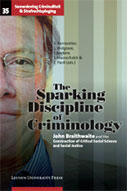The Sparking Discipline Of Criminology: John Braithwaite And
The Construction Of Critical Social Science And Social Justice

Editors: Stephan Parmentier, Lode Walgrave, Ivo Aertsen, Jeroen Maesschalck and Letizia Paoli.
Publisher: Leuven, Belgium: Leuven University Press, 2011. 164p
Reviewer: David Biles | May 2013
This slim volume is a beautifully crafted festschrift in honour of John Braithwaite and was produced after his award of an honorary doctorate by the Catholic University of Leuven in 2008. The editors’ introduction sets the scene and provides a quick preview of the five essays which form the bulk of the book together with a final essay by Braithwaite himself. They conclude their remarks by saying: ‘This collection is intended for a wide readership, including academics and researchers, graduate students, civil servants, civil society actors and the media working in the fields of criminology, restorative justice and social regulation.’
They go on to suggest that the readership should not be limited to Europe but can ‘easily extend to other countries and continents, even to the entire globe.’ There is no harm in encouraging as many people as possible to buy and read their book, but in this case the editors’ ambitions are highly unlikely to be achieved largely because much of the content is highly theoretical and will be quite bewildering to many potential readers. (Perhaps a single editor would have been less ambitious than the collective of five who put their names to the introduction.)
The presentation speech, or ‘laudatio’, at the graduation ceremony by Stephan Parmentier is a model that others given a similar task might follow. In a little over three pages Parmentier outlines Braithwaite’s career and achievements in a manner which is factual as well as personal so that the reader, or listener at the actual ceremony, gets to know something of the real man as well as the distinguished scholar.
The first of the five substantive chapters entitled ‘Between evangelism and charlatanism’ by Lode Walgrave from Leuven, discusses the responsibility of criminologists and other social scientists to ensure that their work contributes to ‘a more livable world and a higher quality of social life’. He does us a service to raise this apparently obvious point as, in my view regrettably, there are a significant number of working criminologists who see their job purely as the production of knowledge regardless of what use is made of that knowledge.
In developing this central theme, Walgrave makes a number of valuable observations of penal populism and the influence of radical and critical criminology on society generally as well as on the discipline of criminology itself. He also sees dangers for ‘embedded criminology’ where criminologists become a part of government and are therefore required to `work within the limits defined by mainstream populism and accept government-defined problems as the real ones.’ These restrictions may well also apply to researchers who are not directly employed by governments but accept grants to undertake research requested by government agencies.
Walgrave concludes his chapter by appealing to do good and not embedded scientific research and to address its findings to the public forum. In this way he suggests criminology can contribute to a ‘more solidarity driven and more participatory democracy’.
He certainly provides the reader with much to think about.
The second chapter ‘Our sense of justice’ by Susanne Karstedt from Leeds University contains the only empirical work in the book, but is challenging to the reader as it contains an enormous volume of data, mainly in the form of scattergrams and other graphics. The graphics are helpful but it would still take a considerable time for the reader to master all of the detail.
Karstedt seeks to test Braithwaite and Pettit’s theory of republicanism (as outlined in their Not Just Deserts: A Republican Theory of Criminal Justice, 1990) as providing ‘an explanatory as well as normative connection’ for restorative justice. To do this she presents the basic details and results of two large empirical studies. These studies used the data collected by other researchers or agencies to establish correlations or relationships between imprisonment rates, prison conditions, and measures of individualism, egalitarian values, etc., in 67 separate nations.
She does not provide evidence of the validity and reliability of the measures she uses, but that is not unreasonable as she was not the one who devised the measures. There must be a potential problem, however, as some of the data like the imprisonment rates are relatively objective, while most of the others are clearly subjective, even though they have been reduced to quantifiable scales. For those with a head for figures, this chapter is worthy of close scrutiny.
Tom Daems, also from Leuven, contributed the next chapter ‘Why criminology needs outsiders’. Daems opens his contribution with a withering and witty attack on the practice of using FAQs (Frequently Asked Questions) in service industries and suggests that criminology is in danger of resorting to a FAQ mentality in order to make the most efficient use of the time and patience of practicing criminologists.
He argues that criminology needs ‘outsiders’ whom he identifies as those criminologists who move well beyond FAQs to ask uncomfortable questions about the nature and worth of criminology itself. The outsiders whose work he examines in some detail are: Stanley Cohen, Nils Christie, Louk Hulsman, David Garland and John Braithwaite, all of whom have been more or less critical of traditional criminology and yet are still considered to be ‘core members of our criminological family’.
Daems argues that criminological researchers frequently resort to the traditional straightjackets of assumptions, concepts and conclusions, and this leads him to conclude that uncomfortable questions from outsiders are of paramount importance in safeguarding and developing the critical core of criminological activity.
The fourth chapter ‘Braithwaite, criminology and the debate on public social science’ was jointly authored by Ian Loader from Oxford University and Richard Sparks from the University of Edinburgh. In yet another thought-provoking chapter these two British scholars aim to rethink the character and scope of contemporary social science work on crime, justice and public policy and they suggest, as have a number of others, that the current state of criminology is one of ‘successful failure’ with criminology student numbers increasing and more universities offering courses in criminology while, at the same time, governments are taking less and less notice of the findings of criminological research.
This paradox, which is also discussed by Braithwaite in his chapter later in the book, is seen by Loader and Sparks as being associated with a lowering of the quality of criminological goods, or products. This, they suggest, leads to an inward-looking profession which becomes completely divorced from public concerns about crime and justice which provide criminology with its raison d’etre. After considering a number of possible solutions to this unsatisfactory situation, they conclude with a plea for an in-depth sociological inquiry into the field of criminological knowledge production and offer some hints as to how this might be achieved.
This discussion in extended in the fifth chapter ‘Why research cannot but be trans-disciplinary in complex matters of ethos and justice’ by Bart Pattyn, another scholar from Leuven, who is an ethicist who makes no claims to expertise in either criminology or sociology. Pattyn’s chapter is to some extent a direct response to the previous chapter by Loader and Sparks which he had read. (The circulation of draft chapters between contributors may be one of the reasons why the final appearance of this book took such a long time.)
Pattyn has a number of very interesting things to say about the development of specialization in the sciences, suggesting that specialization is necessary for personal advancement in academe. It provides security and comfort to the scholars involved, but it has the consequence of making communication between disciplines or sub-disciplines very difficult, if not impossible. He argues that the concept of ‘ethos’ is a necessary foundation for trans-disciplinary discussions involving, not only other scholars, but the general public including the media. He concludes: ‘the only truthful option for any discipline is to turn towards the world – and there, everything that happens is intertwined’.
The final contribution by John Braithwaite himself ‘Opportunities and dangers of capitalist criminology’ is a comparatively easy read. In his characteristically straight-forward language he describes his difficulties as a student of sociology which were resolved by his introduction to criminology. He goes on to argue that criminology ‘has been more a force for good than ill in the world’, even though he, like other contributors in this volume, claims that criminology has been weakened by its own success. With increasing student demand for criminology, universities are ‘dumbing down‘ the contents of criminology courses.
Braithwaite sees ‘regulatory capitalism‘ as a force which has led to various quantitative techniques for assessing the performance of academic criminologists and he suggests that: ‘Criminology was much more intellectually vibrant when it was in the process of emancipating itself from the disciplines of its former masters in sociology, psychology and law than today as an emancipated new discipline’. He sees a possible salvation for criminology in the Asian world. In particular he sees the recent formation of the Asian Criminological Society as a ferment of new ideas which is ‘inspiring’.
Among his many other fascinating observations, Braithwaite suggests that Japan, because of its strong collectivist values and a willingness to treat most criminals who are dealt with by the local police comparatively reintegratively, delivers ‘both a low crime rate and a low imprisonment rate, but with some deep problems in terms of republican freedom’. In this and the rest of his extensive work, he has shown that he is always strongly connected to the real world and never just an arm-chair criminologist.
Braithwaite’s use of the term ‘sparking criminology’ refers to what he sees as the highly desirable capacity of some scholars to spark the interest and active involvement of others in separate disciplines as he has himself been ‘sparked’ to collaborate with philosophers, economists and many others in his remarkable professional life. He hints that the use of this term is in ‘homage to Richard Sparks’, the internationally renowned scholar with whom he shares many values.
Notwithstanding what I have said about the likely readership of this book, it deserves to be read by all criminologists who make any claim to appreciating the breadth and depth of the criminological endeavour, and it will make an ideal basis for seminars of graduate students who are wrestling with the question of what is this thing called criminology.
Finally, on a personal note, it is a humbling and quite remarkable thought that in the late 1970s I was able to offer a research position to a youthful John Braithwaite in the Research Division of the Australian Institute of Criminology. Even then he was obviously highly intelligent, hardworking and well-mannered in his dealings with other staff. He quickly became involved in projects focusing on the work of prisoners, victims of crime and, a little later, corporate crime in the pharmaceutical industry. From these modest beginnings it is wonderful to see how his career developed, to place him now at the very top of his profession from where he continues to significantly influence criminal justice policy and the practice of criminology.
David Biles is a consultant criminologist in Canberra, Australia, former Deputy Director of the Australian Institute of Criminology.
biles@netspeed.com.au


